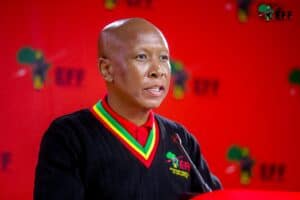In 2012 Solidarity opened two cases of incitement to public violence and incitement to intimidation against Malema – charges he is still facing.

Economic Freedom Fighters (EFF) leader Julius Malema yesterday walked away with a partial win in his application to have the Riotous Assemblies Act declared unconstitutional as it criminalised free speech.
However, Malema failed to escape prosecution under the Trespass Act.
Deputy Judge President Aubrey Ledwaba referred section 18 (2) (b) of the Riotous Assemblies Act to the Constitutional Court but said in the High Court in Pretoria there was no reason to order Malema’s desired relief about being charged under the Trespass Act “as it may, in fact, be nothing more than a defence to a charge against [him]”.
In 2014, Malema was alleged to have encouraged EFF members to occupy land at the party elective conference in Bloemfontein, and again in 2016 in Newcastle, KwaZulu-Natal.
“On November 7, 2016 in Newcastle, Malema unlawfully and intentionally incited, instigated, commanded or procured his Economic Freedom Fighters and/or others to commit a crime, to wit, trespass, in contravention of section 1 (1) of the Trespass Act 6 of 1959, by illegally occupying any vacant land wherever they found some and thereby committing the crime of incitement,” the charge sheet originally declared.
Malema said he would be approaching the Constitutional Court for the Riotous Assemblies Act to be declared unconstitutional in its entirety.
“We believe it doesn’t have a place in a democratic South Africa and now the court disagrees with us, and partially agrees that section 18 (2) (b), which was used to charge us, is unconstitutional,” Malema said after the ruling.
As the highest court in the country, the Constitutional Court is the only court which can confirm any lower court ruling on constitutional matters.
“We hope the NPA [National Prosecuting Authority] will respect the decision of the court and wait for the confirmation of the Constitutional Court on the constitutionality of section 18 (2) (b) of the Act,” Malema said.
AfriForum had laid charges against Malema under the Land Act in 2014 originally, and it was the NPA which made changes to the charges, to inciting people to commit crimes.
In 2012 Solidarity opened two cases of incitement to public violence and incitement to intimidation against Malema – charges he is still facing.
INFO
Ruled unconstitutional
- Riotous Assemblies Act 18 (2): Any person who (b) incites, instigates; commands, or procures any other person to commit, any offence, whether at common law or against a statute or statutory regulation, shall be guilty of an offence and liable on conviction to the punishment to which a person convicted of actually committing that offence would be liable – referred to the Constitutional Court by High Court in Pretoria Deputy Judge President Aubrey Ledwaba as unconstitutional.
For more news your way, download The Citizen’s app for iOS and Android.






